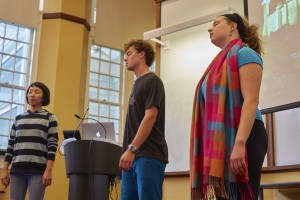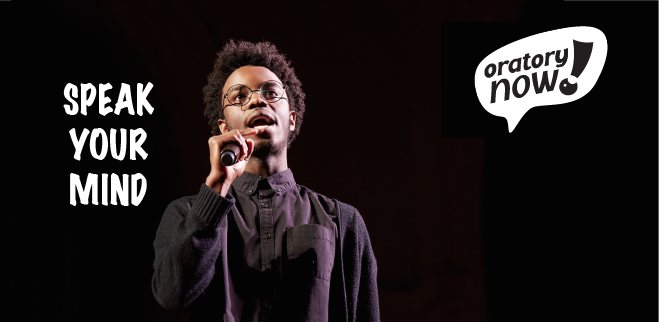We believe that any course with a speaking, writing, or discussion component can benefit from attention to oratory.
Speech training can obviously be used to support and assess oral presentations, but the practice of speaking our thoughts aloud — of measuring the clarity and impact of our words on an audience — can also illuminate elements of the writing process, and help streamline and deepen classroom discussion.
Oratory can be seamlessly integrated into a lesson, or unit plan. It need not take extra time.
Below you’ll find more information about the Oratory Now Classroom Coaching program, including comments by faculty members about how they’ve integrated coaches into their curriculum, and their assessment of the program.
This fall, Oratory Now coaches worked with:
11 faculty members in courses across the curriculum
175 students
and over 100 students in first-year seminars
For further information, or to inquire about having Oratory Now coaches work with your students, please CLICK HERE.
Training of Classroom Coaches
Only the most experienced Oratory Now coaches are eligible to work directly with Participating Faculty.
To be certified as an Oratory Now coach, students must complete nine hours of training, during which they practice speaking and giving feedback to their peers. As a group, the coaches experiment to develop new training methods and share best practices for improving student performance.
Newly certified coaches help others lead workshops and special group sessions; the more experienced and skillful coaches are eligible to become Assistant Classroom Coaches, observing and working together with their more experienced peers.
Only after serving as an Assistant Classroom Coach can a student work directly with the Participating Faculty member as a Classroom Coach.
To be re-certified each semester, coaches must complete 3 additional hours of training. Coaches are strongly encouraged to participate in speaking events such as MLK Today, NER Out Loud, TEDxMiddlebury or Middlebury Moth-UP.
How To Incorporate Student Coaches
Oratory Now coaches have been used in a variety of ways: leading an in-class workshop, preparing students for oral presentations, interviews, poster presentations etc. Individual and small groups sessions have occurred both in and out of the classroom.
Here is a sampling of how some faculty members say they have incorporated Oratory Now coaches:
- I had the Oratory tutors come to a class and do a 15-20 minute workshop on the basics of public speaking. They did a few great interactive exercises that really hit their key points home. I also had the same two workshop leaders come and be audience members for an in-class “expert interview” assignment I had my students do. My students answered questions for 5 minutes on a topic of their choice (they had written research papers about these topics earlier in the semester). The Oratory tutors gave a little feedback to each student after their interview was complete and they also typed up a few observations about each student that they ended up sending to me via email. I integrated some of the Oratory Tutors’ observations into my final feedback for each student.
- [The Oratory Coach] came to class regularly when students were presenting (in this class presentations were very regular, about 10 classes of 24). [The coach] and I would together give feedback about the presentations (I would concentrate on content and [the coach] would concentrate on delivery).
- The student coaches met with each team of students prior to their class presentations. The students presented to the coach who then supplied feedback about presentation style, clarity, organization, and timing.
- Our course . . . featured 4 teams of 5 students. Each team made 2 public presentations on their project–including a presentation off campus to community partners. These presentations were a very important part of the course and we practiced them multiple times. The Oratory Now coaches came into class and worked with each of the 20 students on crucial skills such as poise, eye contact, and presence.
Faculty Responses
On a Faculty Response Form, we asked “How likely are you to recommend Oratory Now to a colleague?” So far, on a 1-10 scale (10 = very likely), we are a perfect 10.
We also asked for testimonials:
- Oratory Now was an important part of my FYS, and I will definitely want to include it in the future.
- Oratory Now is one of the best programs and resources at Middlebury. I have witnessed students go from being timid inaudible speakers to confident compelling orators after just a few workshops with Oratory Now.
- Oratory tutors have been invaluable to my class. Thank you again for all your work!
- Oral presentation skills are so important after graduation but many of our students do not receive any training or practice with this. Oratory Now is a fantastic resource for faculty who want to incorporate presentations into course assignments.
- This is the second time I have worked with Oratory Now. I worked with them in two different classes featuring different engagement–team and single student presentations, inside of class and outside of class. The students and I both agreed that these were great experiences and I will continue to work with Oratory Now whenever my class features public presentations.
- Just a brief note to sing the praises of [two Oratory Now coaches]. They both did superb work with the students in my first year seminar, who all presented their speeches this evening. It was a moving series of speeches—moving because so many of the students managed, with some coaching, to develop their own respective voices and presented a meaningful narrative of a personal experience that had “taught” them in some way. I would recommend this program to others; we’ll see, once the students fill out their evaluations, whether they agree!
Faculty References
Below are the names of participating faculty members who have agreed to serve as references for Oratory Now. Please feel free to contact them for their opinions:
- Mez Baker-Médard
- Chris Klyza
- Michelle McCauley
- John McLeod
- Robert Schine
- Sarah Stroup
- Peter Ryan
For further information, or to inquire about having Oratory Now coaches work with your students, please CLICK HERE.
